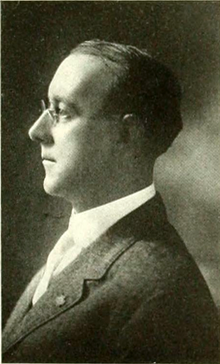Edward Lawrence Logan: Difference between revisions
added Category:Harvard College alumni using HotCat |
added Category:Boston Latin School alumni using HotCat |
||
| Line 75: | Line 75: | ||
[[Category:United States Army generals]] |
[[Category:United States Army generals]] |
||
[[Category:Harvard College alumni]] |
[[Category:Harvard College alumni]] |
||
[[Category:Boston Latin School alumni]] |
|||
Revision as of 07:40, 16 January 2019
Edward Lawrence Logan | |
|---|---|
 Logan, c. 1916 | |
| Personal details | |
| Born | January 20, 1875 South Boston |
| Died | July 6, 1939 (aged 64) Boston |
| Profession | Soldier Officer Politician |
| Military service | |
| Years of service | 1897–1919 |
| Rank | Major General |
Edward Lawrence Logan (1875–1939) was an American lawyer, judge, military officer, and politician from Boston, Massachusetts. Rising to the rank of major general and given command of the 26th Infantry Division of the United States Army, Logan was instrumental in the post–World War I reorganization of that unit. Logan also won election to the Massachusetts state legislature and to the Boston City Council and served as head of the American Legion in his state.
General Edward Lawrence Logan International Airport, an international airport located in the East Boston neighborhood of Boston, is named after him.
Biography
Early years
Edward Lawrence Logan was born January 20, 1875 in South Boston, Massachusetts, to Lawrence J. Logan and his wife, Catherine M. O'Connor Logan, a military family.[1]
He attended Boston Latin School before enrolling at Harvard College.[1]
Political career
In 1897, still in school, Logan enlisted in the 9th Infantry Regiment of the Massachusetts Volunteer Militia as a sergeant major, serving in that unit for the duration of the Spanish–American War.[1] He returned in the fall of 1898 and enrolled at Harvard Law School, and while still a student there was elected one of 75 members of the Boston Common Council, on which he served from 1899 to 1900.[1]
Upon his graduation in 1900, Logan ran for election to the Massachusetts House of Representatives, winning a seat on that body and serving from 1901 to 1902.[1] He retired from office at the end of his term and entered into legal practice in Boston, where he would remain for more than a decade.[1]
Logan remained politically inclined and in November 1905 he was elected as a Democratic State Senator, representing a district in South Boston.[1] He served in the State Senate during 1906, while unsuccessfully running in the Democratic primary election for United States Congress in the fall of that same year.[1]
The following year, 1907, Logan was tapped as an associate justice of the Municipal Court for the South Boston District by Republican Governor Curtis Guild, Jr.[1]
Military career
Although Logan withdrew from the Massachusetts state militia in 1899, he rejoined in 1901, appointed to the rank of 2nd lieutenant in the 9th Infantry Regiment.[1] He served throughout the decade in that unit and won several promotions, ending in the rank of captain.[1] In February 1911 he was promoted to major and in May 1912 to colonel of the Massachusetts 9th Regiment.[1]
In March 1917, Logan's unit was mobilized to guard installations in anticipation of the US declaration of war on Germany. After several months of guard duty, the 9th was redesignated as the 101st Infantry Regiment and assigned to the 26th Infantry Division, organized from the National Guards of the New England states. Logan accompanied his troops to France in command of the 101st.
In April 1919, the regiment was relieved of active duty, and Logan oversaw its reorganization into the Massachusetts National Guard. In January 1921 Logan was promoted to brigadier general and took command of the 1st Infantry Brigade. In March 1923 he was promoted to major general and given command of the 26th Division. As its first post-war commander, General Logan was responsible for reorganizing and training the division as a completely Massachusetts unit.
Post war life
Throughout the remainder of his life, Logan achieved prominence as an advocate for veterans as the state commander of the American Legion and president of the National Guard Association of the United States. He retired from the Guard in 1938.
Death and legacy
Edward Lawrence Logan died in Boston on July 6, 1939. He was 64 years old at the time of his death.
In 1943, Boston Airport/Jeffery Field was renamed General Edward Lawrence Logan Airport in Logan's honor. Although Logan was not an aviator, he did lobby intensely for veteran benefits to include the high risk group of pilots.
A statue of General Logan by Joseph Coletti was unveiled at the airport entrance in a public ceremony in 1956. It has been moved several times to accommodate the airport's growth.
Footnotes
Further reading
- Matt Viser and Martin Finucane, "New Airport Name Sought to Honor Kennedy", The Boston Globe, Sept. 3, 2009.
External links
- Leonid Kondratiuk, "About Logan: Major General Edward L. Logan", Logan Airport website, www.massport.com/
- 1875 births
- 1939 deaths
- American military personnel of the Spanish–American War
- American military personnel of World War I
- Boston City Council members
- Harvard Law School alumni
- Massachusetts National Guard personnel
- Massachusetts state court judges
- Massachusetts state senators
- Members of the Massachusetts House of Representatives
- People from South Boston
- Politicians from Boston
- United States Army generals
- Harvard College alumni
- Boston Latin School alumni
